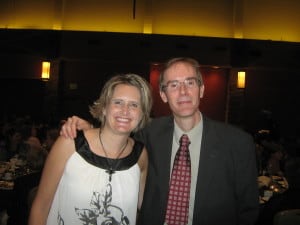
RI: Ooh, you used the V-word a minute ago. Talk to me about voice.
What it is and how you get it. I know you talked about that some in
your e-book, but give us the highlights here. Voice is something that
all my agent friends talk about and ditto for my editor friends.
That’s the one thing they’re all hoping to see when they open a query
or a proposal.
MD: Voice is something you know you have when you no longer take in
EVERY piece of criticism you receive. When you first start writing,
you must listen to everyone, then try on their words. But once you’ve
found your voice (for me around year 7), you begin to see where your
blind spots are and your strengths. Voice is your own unique way of
writing things. It should be wholly you, not a copy of someone else’s
style.
RI: It’s kind of the soul of your writing. What can a writer do to
develop her voice?
MD: Write and write and write and write.
RI: In other words, “Butt in chair.” Dang!
MD: Mine came (developed) as I wrote over 100 columns for a local paper.
RI: I was hoping it would be some magically easy trick. I think I
finally started getting my voice after writing for about 4 years. But
it wasn’t really developed until about Year 7 or 8. That’s when I
noticed that there was something distinctive about my writing that I
didn’t see in any other book.
MD: So you and I have now officially developed a formula. BOC + 7 years = Voice
RI: Do you think that getting critiqued or edited can help develop voice?
MD: Not necessarily. That’s more for flow and mechanics and clarity.
You are your voice, so it would be hard for someone to pull it out of
you.
RI: My friend Larry Brooks likes to give a sports analogy: “You
can’t coach speed.” Likewise with voice.
MD: Yes. And I think there are people out there who are enamored with
publishing but have no business writing for publication.
RI: What I think a critiquer or editor can do is to say, “Oooooh, I
really like what you did there.” And then you start doing more of
that, and there’s your voice. But I tend to agree with you that
nobody can tell you, “Do this and that and you’ll have your voice.”
All they can do is recognize what you already have.
MD: Right.

0 Comments